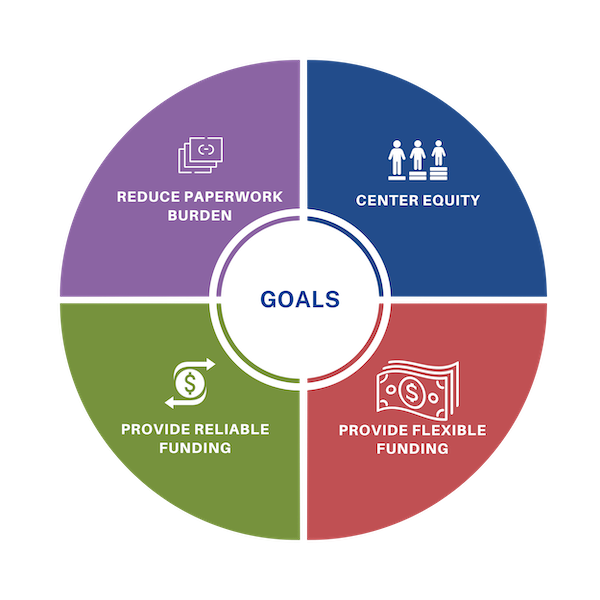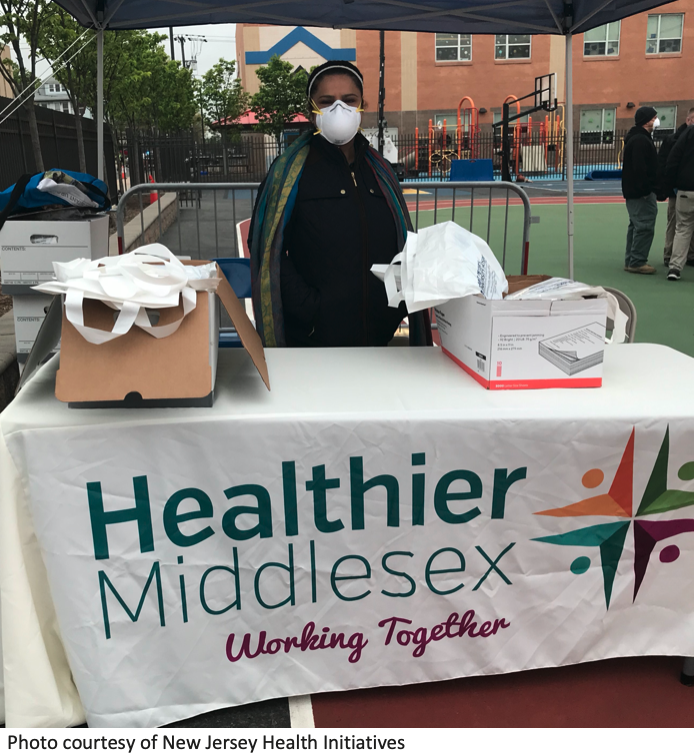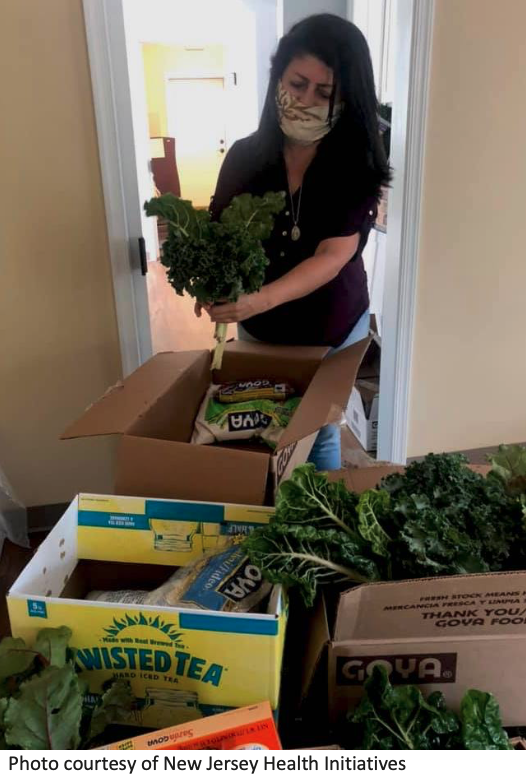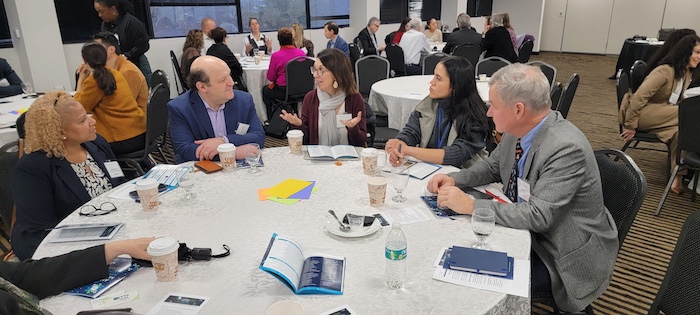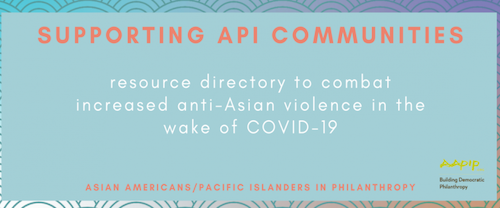Site Search
- resource provided by the Forum Network Knowledgebase.
Search Tip: Search with " " to find exact matches.
Two of the grants – a $153,500 grant to Joseph Kushner Hebrew Academy and a $40,650 award to Greater MetroWest Day School Initiative Mental Health Partnership – are second-year renewal grants stemming from the Foundation’s 2024 initiative to strengthen the behavioral health supports available to adolescents in the Jewish community of Greater MetroWest, NJ. Under this campaign, organizations which serve children and teens in the local Jewish community were invited to apply for support. Between the initial first-year grants and second-year renewal grants, a total of $1,073,439 has now been awarded through this special initiative over two years.
“We are proud that our initiative to strengthen behavioral health of Jewish adolescents, which stemmed from conversations with the community in 2023, continues to provide critical support at this fragile moment in our community’s history” said Michael Schmidt, Executive Director and CEO of The Healthcare Foundation of NJ. “Our grants this quarter demonstrate that when HFNJ sees an important need, it remains committed with ongoing funding and support.”
The F. M. Kirby Foundation Board of Directors approved 116 grants totaling $8,937,600 in the first half of 2025 to support nonprofit organizations dedicated to strengthening and enriching our communities. This total reflects grants awarded in 2025 and multi-year commitments.
In all, 67 grants included general operating support and 59 grants were made to organizations that have been partners of the Foundation for over 25 years, a result of the Foundation’s strategy of forming long-term, trusting relationships with grantees. Grants approved from January through June included a combined $4.2 million to organizations working in New Jersey and North Carolina, the Foundation’s primary geographic areas of interest. Additional grants, totaling over $4.7 million, supported organizations in Connecticut, New York, Pennsylvania and other regions dear to Kirby family members, as well as national nonprofits largely based in Washington, D.C., and New York City.
The New Jersey Historic Trust, an affiliate of the New Jersey Department of Community Affairs (DCA), approved a total of $13,839,484 in grant recommendations from the Preserve New Jersey Historic Preservation Fund to save and promote historic sites throughout the state. Sixty-seven preservation planning, municipal, county, and regional planning, heritage tourism, and capital projects are included in this year’s list of recommendations.
“New Jersey has made a significant impact in our nation’s history. This impact is visible in our state’s incredible array of historic sites spanning nearly three centuries where residents and tourists alike can learn about and appreciate New Jersey’s unique heritage,” said DCA Commissioner Jacquelyn A. Suárez. “The grant recommendations made today by the New Jersey Historic Trust will help these special sites continue to captivate and inspire visitors for years to come. Our state’s historic places are worth protecting and we’re proud to be a part of the preservation effort.”
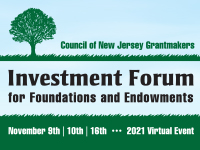
Dates & Times
Tuesday, November 9 - 1:00 to 5:00 p.m.
Wednesday, November 10 - 1:00 to 5:00 p.m.
Tuesday, November 16 - 1:00 to 5:00 p.m.
CEOs, executive directors, CFOs, trustees, investment committee members, and finance managers of foundations and endowed nonprofits gathered together over three afternoons of learning and discussion during CNJG’s 2021 Investment Forum for Foundations and Endowments.
Attendees heard from leading asset managers, financial service institutions, professional advisors and practitioners who shared best practices and valuable insights focused on successful endowment management. Pointed, strategic, and masterful keynote speeches and educational workshop sessions explored a wide range of timely and useful topics, such as impact and ESG investing, gift acceptance policies, alternative investments, governance and due diligence, and so much more.
Sustainable philanthropy thrives on careful and skillful stewardship of the corpus. This signature event grew out of the Council of New Jersey Grantmakers’ Finance and Investment Affinity Group convenings, which have long offered CFO’s, investment committee members, board chairs and others with oversight of their endowment, exposure to a wide range of representatives, as well as thoughtful expertise and perspectives from the investment community.
Access Whova until May 16, 2022!
Registrants can access all three plenary sessions and 11 concurrent sessions on Whova for six months after the event, until May 16, 2022. You can log in with the same email and password you used to access the event. Visit Whova.
For questions, please contact Anna D'Elia, Manager of Programs and Learning.
The F. M. Kirby Foundation Board of Directors announced 249 grants totaling $14,354,050 were made in 2022 to nonprofit organizations working to foster self-reliance and create strong, healthy communities. Over half of these organizations have been partners of the Foundation for over 20 years, in keeping with the Foundation’s philosophy of long-term investments in effective programs.
The Foundation’s 2022 grantmaking included increased contributions to nonprofit organizations in the arts and humanities, education, health, human services, environment and animals, public affairs, and religion. Over 100 grants totaling more than $5.2 million were awarded to New Jersey-based nonprofit organizations working to make a direct impact on people’s lives throughout the state, 60 of which (totaling $3.1 million) supported work in Morris County, the Foundation’s home county. Additional grants totaling over $9 million supported organizations in Connecticut, New York, Pennsylvania, and North Carolina, regions connected to Kirby family members, as well as national nonprofits largely based in Washington, D.C. and New York City.
Reflecting on a year of grantmaking supporting both consistent community partners and exciting new initiatives, Executive Director Justin Kiczek stated, “The F. M. Kirby Foundation was founded more than 90 years ago by Fred Morgan Kirby, an entrepreneur. The values that led to his success have informed this organization and its grantmaking since its founding. We are proud of the ways in which we supported, in 2022, the entrepreneurs, innovators, and problem-solvers who are fostering strong and healthy communities. On a local level, our grantmaking this year supported organizations like Rising Tide Capital, based in Jersey City, NJ, in their mission to transform lives and communities through entrepreneurship. On the other hand, we continued to promote national and global social entrepreneurship through the F. M. Kirby Prize for Scaling Social Impact, administered by the Center for the Advancement of Social Entrepreneurship at Duke University’s Fuqua School of Business. We remain committed to funding the next generation of Fred Morgan Kirbys, who are inspired to use their entrepreneurial vision to tackle the significant challenges of our era.”
70 years after Brown vs. The Board of Education, segregation and resource inequities continue in New Jersey schools. Discussion will center on the lawsuit brought by 9 families with a coalition of civil rights, faith, and social justice groups. Meet Dr. Charles Payne, Director, The Cornwall Center for Metropolitan Studies Rutgers; Dr. Jesselly De La Cruz of Latino Action Network Foundation; Vivian Fraser of Urban League of Essex County; Jared Hunter with Salvation and Social Justice; and Brandon McKoy of The Fund for New Jersey.
New Jersey boasts one of the top education systems in the U.S. but our public schools are also among the nation’s top 6 or 7 most segregated. We see substantial differences in resources afforded across our 620 districts aligned with home rule. This results in significant harm in outcomes for students in segregated districts, including the 63% of all Black and Latino students who attend schools segregated by race and poverty.
Panelists: Dr. Jeselly De La Cruz, Executive Director at Latino Action Network Foundation; Vivian Cox Fraser, CEO of Urban League of Essex County; Dr. Charles Payne, Director, The Cornwall Center for Metropolitan Studies, Rutgers University; Jared Hunter, Organizing Director with Salvation and Social Justice; Brandon McKoy, President, The Fund for New Jersey
Cost: Free for CNJG Members, $50 for Non Member Grantmakers.
Webinar Video
Cornwall Research Finding Summary: The Latinx Experience in NJ Schools: A Preliminary Overview
Dr. De La Cruz referenced article from Chalkbeat: New Jersey school segregation case: A look at key points, what’s next in Latino Action Network vs. NJ
Please join us for our first Newark Funder Affinity Group Meeting of 2025. We will use this time to receive an update from La Casa de Don Pedro and partners on funding and the plan for their resource center, discuss the new federal policy and grant environment, and update each other on priorities in order to identify areas of possible collaboration for 2025 and beyond.
Cost: Free for CNJG Members; $75 for Non Member Grantmakers
This program is only open to staff and trustees from grantmaking organizations.
Sample disaster preparedness and recovery plans for foundations.
Philanthropic Collaboratives:
Driving Impact and Opportunity
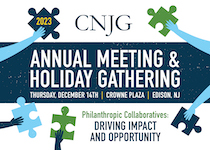 Thursday, December 14, 2023 - 9:00am to 3:00pm
Thursday, December 14, 2023 - 9:00am to 3:00pm
Luncheon, Keynote Presentation & Workshop
Location: Crowne Plaza Edison, 2055 Lincoln Highway, Edison, NJ 08817
The Council of New Jersey Grantmakers thanks everyone who attended our 2023 Annual Meeting & Holiday Luncheon and the Pre-Meeting Workshop that explored Philanthropic Collaboratives: Driving Impact and Opportunity. We were thrilled to reconnect with friends and colleagues and meet new members.
At the Business meeting, the membership elected the new class of Trustees. We also honored our outgoing Board Chair, Jeff Vega, for all the incredible work he accomplished during his term. After lunch and networking time, we listened attentively to Nidhi Sahni, Partner and Head of US Advisory Group, New York, Bridgespan, and Lucy Vandenberg, Executive Director of the Schumann Fund for New Jersey in conversation about the nuances and benefits of collaboration.
At the pre-meeting workshop, Tools for Funder Collaboration, presented by John Harper, Chirlie Felix, and Waheera Mardah of FSG, members were presented multiple models of collaboration and examples of collective impact followed by an opportunity to engage in dynamic discussion to further explore the concepts.
CNJG members can view the FSG PowerPoint and additional resources from the event on the resources tab, when logged in.
CNJG’s Finance and Investment Affinity Group exists to keep foundation executives informed as they manage the investment of their corpus. Growth of foundation assets and the active exchange of sound investment strategies is the focus of each program.
After a positive year for both stock and bond markets that caught many investors off guard, grantmaking organizations and their boards may be wondering whether 2024 will be a repeat of 2023, or a reversal. Join us for a breakfast presentation and Q&A where we will discuss J.P. Morgan’s views across traditional and alternative asset classes for the year ahead.
Michael Garvey is a Managing Director and the East Region Head ofJ.P. Morgan’s Outsourced Chief Investment Office. In this role, he manages the OCIO team’s largest geography by AUM. Michael and his team work with endowments, foundations and institutional family offices across the country to develop investment strategies, build customized separately managed portfolios and invest across long-only and alternative investments for some of the most sophisticated investors around the world.
Michael Pages is a Senior Banker and Executive Director at J.P. Morgan. He works alongside a team of professionals who share responsibility for advising endowments, foundations and select family offices across the US on a variety of matters including asset allocation, portfolio construction, capital and liquidity strategies and execution. He has deep expertise in the Outsourced Chief Investment Officer (OCIO) model and is Team Lead.
Agenda
8:30 a.m. - Breakfast
9:00 a.m. - Program begins
10:00 a.m. - Meeting concludes
Cost: $35 for CNJG Members; $70 for Non Member Grantmakers (includes full breakfast)
Learn how to support a disability-inclusive COVID-19 response.
COVID-19 disproportionately threatens the physical, financial, and emotional health of people with disabilities. Individuals with pre-existing health issues are at greater risk of contracting the coronavirus, many in the disability community still lack access to healthcare, and -- according to the National Trends in Disability report from the Kessler Foundation and University of New Hampshire’s Institute on Disability -- nearly one million working-age people with disabilities lost their jobs.
In this webinar, we’ll hear from Elaine E. Katz, MS, CCC/SLP, Senior Vice President Grants and Communication at the Kessler Foundation and Audrey Winkler, Executive Director of JESPY House.
Speakers will explore:
· Unique challenges facing people with disabilities during COVID-19.
· How philanthropy can support workforce opportunities for people with disabilities.
· Efforts to address ableism and create more inclusive policies and practices, on a national and local level.
For a truly equitable recovery that centers the experience of people facing multiple forms of systemic discrimination, we must address the ableism embedded in our systems, institutions, and culture. Join us for this important conversation on how your organization can address ableism in your fight for social justice, and support a more disability-inclusive response to COVID-19.
Cost: Free for CNJG Grantmakers. $50 for Non Member Grantmakers
Webinar Video
A Framework for Change
The Doing Good Better Steering Committee encourages funders to focus on and advocate for four (4) changes that can make an immediate difference in addressing power dynamics between nonprofits and funders and maximizing nonprofit impact. These goals are aligned with Trust Based Philanthropy, and are interdependent; when combined, they foster equity and a spirit of mutual trust between grantmakers and nonprofit partners. For more details about a specific goal, click on its individual goal link below.
• Goal 1: Center Equity
• Goal 2: Provide Flexible Funding
• Goal 3: Provide Reliable Funding
• Goal 4: Reduce Paperwork Burden
Self-Assessment/Reflection Tool for Funders
Philanthropy and Nonprofits for Greater Impact: The “Doing Good Better” Blueprint Video
The National Center for Family Philanthropy and Youth Philanthropy Connect, a program of the Frieda C. Fox Foundation, have joined together to bring new resources to the field of philanthropy focused on engaging the next generation of donors and family members. Igniting the Spark: Creating Effective Next Gen Boards is the first publication of its kind, offering a comprehensive overview of the growing practice among family foundations and donor advised fund holders of using next generation boards.
The issue brief outlines creative options for involving children as young as 8 in family philanthropy. It is supplemented by case studies of seven foundations using next gen boards and other approaches for engaging youth in philanthropy. Throughout both resources, the voices of next gen donors describe what works — and what doesn’t — providing family members and staff with guidance and insights new to the field.
Learn how you can register for events online, search the member directory for organizations and colleagues who have the same interests, and update your profile.
These news articles show our members’ responses to the coronavirus pandemic, including announcements, emails, blogs, grants and other resources. If you have items to add, please email us.
Actions and Announcements
Audible Creates Global Center for Urban Development and Hires Aisha Glover to Help Lead It
Russell Berrie Foundation Post: Our Response to COVID-19
Campbell Soup to pay hourly employees premium during outbreak
Post: Our Response to COVID-19
Geraldine R. Dodge Foundation
Dodge signs CoF pledge
Grunin Foundation 3/13 COVID-19 Announcement and 3/31 COVID-19 Update
Johnson & Johnson’s lead COVID-19 vaccine candidate shots for early 2021 authorization
Robert Wood Johnson Foundation
Culture of Health Blog: Handwashing to Slow the Coronavirus Pandemic
Opinion: Racism is the other virus sweeping America during this pandemic by Julie Morita, M.D
Opinion: Disabled Americans can’t be a COVID-19 afterthought by Dr. Richard Besser
Culture of Health Blog: Incarceration Rates: A Key Measure of Health in America
Opinion: In Covid-19 Crisis, Philanthropy’s Attention Must Focus on People With Disabilities
Brief: Health Equity Principles for State and Local Leaders in Responding, Reopening & Recovering from COVID-19
Culture of Health Blog: Lessons for an Equitable COVID-19 Response and Recovery
Kessler Foundation has produced two COVID related podcasts:
Practical Tips to Help Survive the Pandemic as a Parent of a Child with Autism
COVID-19 and Spinal Cord Injury: Minimizing Risks for Complications
New Jersey Council of Humanities Op-ed: Staying Human During the Pandemic
New Jersey Health Initiatives’ Deputy Director of Programs, and CNJG Board Member Diane Hagerman penned “Collaboration across county lines is key to a healthy New Jersey” on NJ Spotlight.
New Jersey Council for the Humanities and New Jersey Historical Commission present a webinar series for cultural nonprofits navigating the COVID-19 pandemic
New Jersey Economic Development Authority assists more than 10,000 small businesses impacted by COVID-19
New Jersey State Council on the Arts partners with ArtPride New Jersey Foundation on “Keep Jersey Arts Alive” campaign.
Newark Arts and the City of Newark Retools Its Ambitious Arts Grant Program to Respond to COVID-19
Nicholson Foundation Email to Grantees
Nicholson honors their own Colette Lamothe-Galette, lost to COVID-19
OceanFirst Foundation and Grunin Foundation along with Townsquare Media Launch Acts of Kindness Campaign
Subaru teams up with TerraCycle on PPE recycling
Turrell Fund Email to Grantees about CARES Act
Turrell Fund manages new Passaic County Pandemic Partnership hosted at the Community Foundation of New Jersey
United Way of Greater Mercer County Op-ed message from Sandra Toussaint
Valley National Bank offers Community Pledge CD to help donate and save at the same time
Resources
New Jersey State Council on the Arts Resources for Artists and Arts Organizations
Video: Hear from recognizable native New Jersey voices about the importance of donating to the New Jersey Pandemic Relief Fund
2026 CNJG Membership Renewal
Thank you for your membership investment with CNJG!
We continue using our contactless renewal process for the 2026 membership year. We no longer mail renewal notices. The “primary contact” for each member will receive the renewal notification by email in mid-October, 2025
“[CNJG has] done an amazing job of meeting people where they need to be in terms of providing additional resources and access to people in the know to help us navigate through very unchartered waters.”
-Margarethe Laurenzi, Maher Charitable Foundation
The dues investment for 2026 includes a Board-approved 3% increase. Members should base their 2026 dues on either:
1. Your 2025 giving or
2. An average of the past three years in giving (2023, 2024, 2025).
The chart of dues, based on your annual giving is below:
| Annual Giving Level | 2026 CNJG Dues |
| $ 0 to $ 100,000 | $ 795 |
| $ 100,001 to $ 250,000 | $ 955 |
| $ 250,001 to $ 500,000 | $ 1,485 |
| $ 500,001 to $ 750,000 | $ 1,900 |
| $ 750,001 to $ 1 million | $ 2,650 |
| $ 1 million to $ 2 million | $ 3,700 |
| $ 2 million to $ 3 million | $ 5,900 |
| $ 3 million to $ 5 million | $ 8,500 |
| $ 5 million to $7.5 million | $ 10,470 |
| $ 7.5 million to $10 million | $ 11,075 |
| $ 10 million to $15 million | $13,250 |
| $ 15 million to $20 million | $16,250 |
| $ 20 million to $30 million | $23,700 |
| $ 30 million to $50 million | $26,500 |
| $ 50 million to $75 million | $36,875 |
| $ 75 million and above | $43,000 |
The membership period begins January 1, 2026 and runs through December 31, 2026.
Some members choose to make all or a portion of their dues in the form of a grant. For tax purposes, all dues in excess of $795 may be reasonably reported as a grant.
Government agency dues are based on a percentage of your administrative budget. The renewal form will help you calculate your dues.
Dues for associate members (CDFI’s and philanthropic advisors) are a flat $1,680.
For additional criteria for dues calculations (ie. sun-setting foundations, those headquartered outside the state, and other special circumstances), please visit the Membership Policies section of our join page.
Renewal notices are due annually by March 31 with payments due by June 30. You can complete the renewal form today and pay any time before June 30. If you need to pay after June 30, please note the alternate payment date on the renewal form. Please contact Craig Weinrich, Director of Member Services at 609-414-7110 x802 to make payment arrangements. CNJG prefers to receive membership payments by EFT. Checks are also acceptable, and please note our address. If you decide to pay via credit card, CNJG will add a 3% fee to the membership dues amount.
Leadership Gifts
“Engagement with other funds throughout the state as we think about how to be most strategic have been really helpful to understand what others are doing and the implications of how we do our grantmaking activities.”
-Andy Fraizer, Community Foundation of South Jersey
Some members include an additional gift to help cover the costs of CNJG’s operations. Membership dues cover about 40% of our operations. These welcomed and unrestricted funds help underwrite the many programs and services that CNJG provides to our members and the philanthropic sector.
Please indicate your additional leadership gift on the renewal form when you complete it.
2026 Renewal Timeline
- Mid-October 2025 – CNJG membership renewal notices are emailed to the designated “primary” contact;
- March 31, 2026 – CNJG membership renewal commitments due (payment can be received later)
- June 30, 2026 – Dues should be paid by this date. A few members pay in the second half of the year, and CNJG appreciates knowing before then that you are renewing. Members that have not paid by this date, or indicated to CNJG that payment is forthcoming by this date, will be considered lapsed and removed as members.
- Mid-October, 2026 – Renewals for 2027 will be emailed.
2026 Member Renewal Process
- The link to our online renewal notice will be emailed to your designated “primary contact” in mid-October. In subsequent reminders, the invoices will be emailed to both the "primary contact" and the "billing contacts" at the organization. If you have not received any renewal notice, please let Craig know. You can complete the renewal notice here.
- Complete and return the renewal notice with either:
The amount of dues you are paying (based on your giving outlined above) and when CNJG can anticipate the payment.
or
Your pledge to pay at a later point in the year. Payment should be received by CNJG before June 30. Please contact Craig if an alternate payment date is needed. - Submit the renewal notice/invoice with payment or your pledge to renew by March 31.
- Update your contact information by having one of your “administrative contacts” update this information on the website. There are tutorials on our website about this process, or contact Craig with questions.
Looking Ahead to 2027
Our expectation is that for 2027, we’ll ask members to base their giving on your past three years average, or on your 2026 giving. We will also include the annual CNJG board-approved 3% increase in dues. CNJG has mapped out the dues rates for the next several years, so members can budget accordingly.
Thank you for being a part of the CNJG membership as we support and elevate New Jersey’s philanthropic community through shared learning, collaborative and trusting relationships, network building, and leadership.
Join us at the second NJ Corporate Philanthropy Network meeting of the year which will focus on what specific information you should zero in on when searching for any red flags in non-profit 990’s and financial statements. Seasoned Accountants, Sherise D, Ritter and Lovepreet Buttar, from The Mercadien Group will guide us. We’ll also touch on vetting sponsorship requests and hold our traditional round robin where meeting participants can share their burning questions/issues and lessons learned.
Lovepreet Buttar, Managing Director with Mercadien’s Nonprofit and Human Services Group, has extensive experience performing and overseeing audit engagements for various nonprofit organizations, including associations, schools, private foundations, and health and human services organizations. She is passionate about helping these organizations support their constituents and achieve their mission. She is also head of the firm’s Audit and Assurance practice and is responsible for both firm-wide and engagement-specific quality control matters and overseeing training for various for-profit, not-forprofit and government/public entities. In this role, she helps ensure the firm is using best practices that are compliant with Generally Accepted Accounting Principles (GAAP).
Sherise (Sherry) Ritter is Managing Director and Co-Chair of the The Mercadien Group’s Nonprofit and Human Services Group, as well as the Advisory Services Group. Serving as a trusted advisor, she meets with all of her clients at least once a year to advise them on topics such as tax planning and preparation, identifying risk areas and formulating solutions, strategy to meet growth goals, and multi-state and unrelated business income taxation and filing exposures. Additionally, she helps her clients with strategic planning, process efficiency and improvement studies, and mergers and acquisitions. She also specializes in the areas of cash flow management, accounting systems design, and board governance training.
Cost: Free for CNJG Members; $50 for Non Member Grantmakers
This program is only open to staff and trustees from grantmaking organizations.
Webinar Video
Resources
Blank 990 Form
990 Forms and their Schedules
The Overhead Myth: Crash Course to Fundraising Transparency
Charity Navigator's Assessment of Finances
In response to the murders of George Floyd, Breonna Taylor, Tony McDade, Ahmaud Arbery, and countless other Black individuals, we have seen a call to end systemic racism, police brutality, and injustice. To explore philanthropy's role in fighting against racism and injustice, CNJG is sharing information about upcoming programs that we and our Philanthropy-Serving Organizations are presenting and other resources below. While some programs or resources have been organized in direct response to recent protests and calls for action, all are part of a longer conversation on racism in our country and within our sector. As CNJG weaves equity into all of our work, we look forward to continuing these conversations with you.
We realize this is not a comprehensive list, and we are posting items that CNJG staff sees, which is not nearly enough. We ask that our members, especially those who are black and brown, to help us find articles written by, resources created by, and programs led by people of color. Share those resources by emailing us. This page is just a part of our work in equity. We created this page as one starting point for New Jersey’s philanthropic community to engage in conversations, do background reading, attend programs, learn, and take action.
For those members interested in continuing the conversations, we invite you to join our Racial Equity listserve, by emailing Craig Weinrich. On that listserve, members can share information, resources, and opportunities that are helpful to the funding community.
Visit these Websites
Asian Americans/Pacific Islanders in Philanthropy (AAPIP) Resource Directory
This Supporting API Communities Resource Directory was developed to mobilize the philanthropic sector towards meaningful action in the midst of heightened violence and hate targeting Asian American communities.
Participatory Grantmaking
A curated list of resources and articles from Candid on the movement of participatory grantmaking that engages the community in the grantmaking process.
The Power of Asset Framing: A Conversation with Trabian Shorters
This blog post by the Skillman Foundation contains a series of short videos by Trabian Shorters, founder and CEO of BMe Community, who describes shifts in narrative that all philanthropy should consider.
Putting Racism on the Table
This site created by the Washington Regional Association of Grantmakers is the inspiration for CNJG’s Race, Racism and the Ramifications for Philanthropy Series.
Race to Lead Series
A site with reports and surveys on the racial leadership gap in the nonprofit sector.
Stanford Social Innovation Review
The Struggle to Overcome Racism, a list of resources to help leaders of social change and activists.
Trust-Based Philanthropy Project
A peer-to-peer learning and advocacy initiative to make philanthropy more based on trust.
President Obama's Hurricane Sandy Task Force released this rebuilding strategy to serve as a model for communities across the nation facing greater risks from extreme weather and to continue helping the Sandy-affected region rebuild. The Rebuilding Strategy contains 69 policy recommendations, many of which have already been adopted, that will help homeowners stay in and repair their homes, strengthen small businesses and revitalize local economies and ensure entire communities are better able to withstand and recover from future storms.
A CNJG corporate member asked for help with the scenario in which a corporate policy of not supporting religious organizations in their grantmaking, causes problems helping during a disaster in an urban or rural area, when the program that is delivering the disaster relief is based within a church. They want to work with those programs (a church serves as the program’s fiscal sponsor) who support efforts for hunger, homelessness, substance abuse recovery, racial equity, etc. as long as they do not discriminate and do no limit it to their own congregations. The request for policy samples to work around this religious organization hurdle as long as there is no discrimination or funding the actual church’s worship, was compelled by CNJG staff and is listed here.

